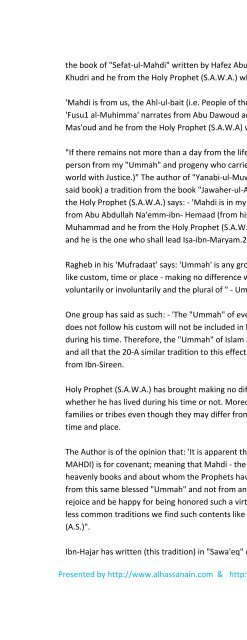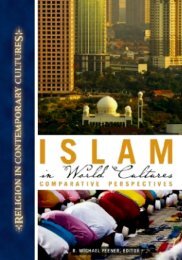Download Here - Islamic Books, Islamic Movies, Islamic Audio, All ...
Download Here - Islamic Books, Islamic Movies, Islamic Audio, All ...
Download Here - Islamic Books, Islamic Movies, Islamic Audio, All ...
You also want an ePaper? Increase the reach of your titles
YUMPU automatically turns print PDFs into web optimized ePapers that Google loves.
the book of "Sefat‐ul‐Mahdi" written by Hafez Abu‐Na'eem who in turn narrates from Abu Sa'eedKhudri and he from the Holy Prophet (S.A.W.A.) who said:'Mahdi is from us, the Ahl‐ul‐bait (i.e. People of the House). He is from my 'Ummah'. The author of'Fusu1 al‐Muhimma' narrates from Abu Dawoud and Tirmidhi and these two from Abdullah‐ibn‐Mas'oud and he from the Holy Prophet (S.A.W.A) who said:"If there remains not more than a day from the life the earth, God will set the day so long until aperson from my "Ummah" and progeny who carries the same lame as mine appears (and fills theworld with Justice.)" The author of "Yanabi‐ul‐Muwadda" has narrated (on page 433 of his aforesaidbook) a tradition from the book "Jawaher‐ul‐Aqd'ain" of Abu Sa'eed Khudri. In that traditionthe Holy Prophet (S.A.W.A.) says: ‐ 'Mahdi is in my Ummah'. Also the afore‐said author narratesfrom Abu Abdullah Na'emm‐ibn‐ Hemaad (from his book of "Al‐Fatan" and he from Hisham‐ibn‐Muhammad and he from the Holy Prophet (S.A.W.A.) who said: ‐ "Mahdi is from this "Ummah"and he is the one who shall lead Isa‐ibn‐Maryam.20"Ragheb in his 'Mufradaat' says: 'Ummah' is any group of people which is formed through thingslike custom, time or place ‐ making no difference whether that thing brings them togethervoluntarily or involuntarily and the plural of " ‐ Ummah" is "(???) ‐ Ummam."One group has said as such: ‐ 'The "Ummah" of every Prophet are his followers and the one whodoes not follow his custom will not be included in his "Ummah" even though he may have livedduring his time. Therefore, the "Ummah" of Islam are those people who follow the <strong>Islamic</strong> rulesand all that the 20‐A similar tradition to this effect has come in "Arf‐ul‐wardi" page 65 narratedfrom Ibn‐Sireen.Holy Prophet (S.A.W.A.) has brought making no difference whether he has visited him or not orwhether he has lived during his time or not. Moreover this applies to all, without any difference infamilies or tribes even though they may differ from each other from the view‐point of language,time and place.The Author is of the opinion that: 'It is apparent that the "object of making known" i.e. ('L') in (Al‐MAHDI) is for covenant; meaning that Mahdi ‐ the one who has been remembered in theheavenly books and about whom the Prophets have given glad‐tidings to their nations, ‐ shall befrom this same blessed "Ummah" and not from any other "Ummah". So this "Ummah" deserves torejoice and be happy for being honored such a virtue. It is true that in some of the exceptional andless common traditions we find such contents like this one ‐ "Mahdi is not but Isa‐ibn‐Maryam(A.S.)".Ibn‐Hajar has written (this tradition) in "Sawa'eq" on page 89. Ibn‐Maaja and Hakem have broughtPresented by http://www.alhassanain.com & http://www.islamicblessings.com














